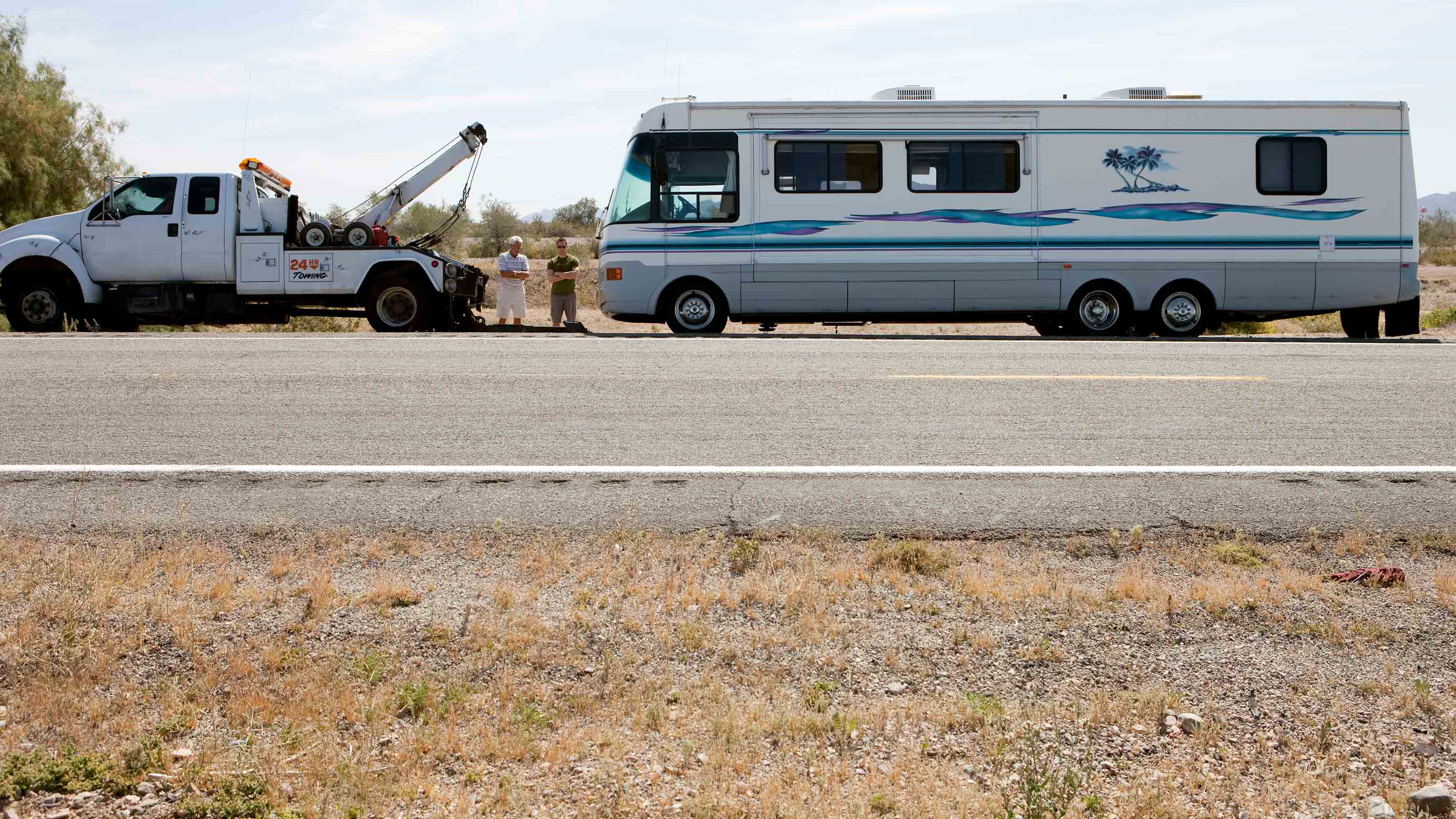15 Reasons You'll Regret an RV in Retirement
Think you might regret an RV in retirement? RV-savvy retirees talk about the downsides of spending retirement in a motorhome, travel trailer, fifth wheel, or other recreational vehicle.

Kathryn Pomroy

Profit and prosper with the best of Kiplinger's advice on investing, taxes, retirement, personal finance and much more. Delivered daily. Enter your email in the box and click Sign Me Up.
You are now subscribed
Your newsletter sign-up was successful
Want to add more newsletters?

Delivered daily
Kiplinger Today
Profit and prosper with the best of Kiplinger's advice on investing, taxes, retirement, personal finance and much more delivered daily. Smart money moves start here.

Sent five days a week
Kiplinger A Step Ahead
Get practical help to make better financial decisions in your everyday life, from spending to savings on top deals.

Delivered daily
Kiplinger Closing Bell
Get today's biggest financial and investing headlines delivered to your inbox every day the U.S. stock market is open.

Sent twice a week
Kiplinger Adviser Intel
Financial pros across the country share best practices and fresh tactics to preserve and grow your wealth.

Delivered weekly
Kiplinger Tax Tips
Trim your federal and state tax bills with practical tax-planning and tax-cutting strategies.

Sent twice a week
Kiplinger Retirement Tips
Your twice-a-week guide to planning and enjoying a financially secure and richly rewarding retirement

Sent bimonthly.
Kiplinger Adviser Angle
Insights for advisers, wealth managers and other financial professionals.

Sent twice a week
Kiplinger Investing Weekly
Your twice-a-week roundup of promising stocks, funds, companies and industries you should consider, ones you should avoid, and why.

Sent weekly for six weeks
Kiplinger Invest for Retirement
Your step-by-step six-part series on how to invest for retirement, from devising a successful strategy to exactly which investments to choose.
If you’re work-weary and ready for retirement, the call of the open road might beckon you to saddle up in a recreational vehicle and take off. The kids are grown and gone and the RV life seems compelling. Sell the house and move on!
If that sounds inviting, you aren’t alone. According to the most recent data from RVBands, over 11 million households owned an RV in the U.S. in 2025. While sales got a bump up during the COVID pandemic, the North American RV market remains robust — worth almost $20 billion — and is forecast to grow to $29 billion by 2029.
And it’s not just retirees who want to hit the road. The Go RVing 2025 RV Owner Demographic Profile and Industry Insights reveals that the average age of RV owners is 49 in 2025, with 46% of owners now falling within the 35-54 age range.
From just $107.88 $24.99 for Kiplinger Personal Finance
Become a smarter, better informed investor. Subscribe from just $107.88 $24.99, plus get up to 4 Special Issues

Sign up for Kiplinger’s Free Newsletters
Profit and prosper with the best of expert advice on investing, taxes, retirement, personal finance and more - straight to your e-mail.
Profit and prosper with the best of expert advice - straight to your e-mail.
But is retiring in an RV right for you? We spoke with retirees who spend much of their time in recreational vehicles for guidance on the cons of RV living in retirement. Key downsides?
“Emptying the sewer tanks. Cost of fuel. Rising costs of campgrounds. Having to manage mail forwarding, unreliable internet access for email and online banking. Managing deliveries from Amazon and prescription refills,” said Geoff Baker, a retired commander with the British Royal Navy who has been RVing across America since 2011 with his wife, Laura (their home base is Polk City, Fla.).
Here’s what the Bakers and others had to say about the downsides of life on the road in an RV.

1. RVs are really expensive
Much of the core appeal of the RV-retirement lifestyle is the perception that an RV costs less than a house, or a “sticks and bricks” home, to use the lingo. But there’s a ton of “it depends” in that equation, and an RV that suits your needs can be a big investment. Before you can set a budget, you need to understand the various options available on the market. A quick primer:
Class A motorhome: These are based on commercial truck chassis, with all bodywork provided by the RV manufacturer. You won’t see a Ford or Ram front end here. While not all Class A motorhomes are large, the biggest, most expensive motorhomes are all Class A. On average, Class A motorhomes can cost from $50,000 to $600,000, but prices can go as high as $2,000,000 for luxury models, according to HomeGuide.
Class B motorhome: That’s the technical term, but it’s rarely used. Owners will refer to their van, or maybe their “Sprinter” (technically a Mercedes model that gets applied generically). While these might be heavily modified, they’re no wider or longer than a factory van that provides their chassis and body shell (though they might be taller), and this makes them popular among travelers who emphasize traveling, whether in urban centers or even off-road. On average, Class B motorhomes cost between $95,000 and $20,000, according to RV Owner HQ, but can go up to $140,000 for a luxury model.
Class C motorhome: Generally, the most affordable of the motorized options, though some can rival Class A in their fitments. Like Class A, these motorhomes are built on commercial chassis, but unlike Class A, they retain the factory cab. So, the driving experience — in particular, your actual view out — is more like piloting a pickup truck. Class C motorhomes can cost anywhere from $30,000 up to $100,000, per Bullyan RV Sales.
Trailers: The cheapest entry to RV living is to buy a trailer of some sort. A folding trailer, sometimes called a pop-up trailer, can cost as little as $6,000 and go as high as $30,000, according to pricing estimates from both the RV Industry Association and Consumer Reports. Conventional travel trailers (a hard shell all the way around) can range between $25,000 and $55,000, depending on size and amenities. Of course, as trailer size goes up, so does the need for a capable vehicle to tow it. The largest of these, fifth-wheel trailers, require a heavy-duty truck whose bed is modified to tow them and can run anywhere from $60,000 for a basic 3/4 ton truck to $90,000 for a one-ton truck.

2. You’ll spend even more money updating your RV's décor
Your taste in decor can differ greatly from RV designers, so you may be spending some dough upgrading the interior living space. This can be especially true if you buy used, but even new RVs can demand immediate upgrades to suit your taste.
RVer Charley Hannagan, whose home base is Pittsburgh, described the interior of her family’s used 32-foot Jayco Precept Class A motorhome as looking like “a 1970s old-age home.”
“It was awful,” she says. “We spent about $2,000 to buy fabric to re-cover the furniture in fabric I liked, to buy melamine dishes that won’t break on the road, organizational stuff and sheepskin covers for the front seats.”
The Bakers redecorated, too. They replaced the mattress on the bed with one of better quality for $900. Also inside, they changed out televisions, curtains, and blinds ($8,000), added a home-grade refrigerator ($350), and bought new recliners and table chairs ($2,000).
Then there’s the outside. What RVs are made of varies, but with the exceptions of the Class B vans and aluminum Airstream trailers (and their imitators), it’s generally not formed and welded metal like a car. Siding, whether aluminum or fiberglass or some other composite, is more common. That was the case for the Bakers, who paid north of $20,000 to have their entire unit re-sided and repainted.

3. Your RV will depreciate in value
You might call it your home, but don’t expect your RV to increase in value over time like most traditional “sticks and bricks” houses do.
“With RVs ranging in price from $30,000 to over $2,000,000, it’s hard to compare them to a home that’s paid off or near being paid off and find financial benefit,” says Margo Armstrong, who previously RVed for over two decades and wrote (but has since retired) the RV blog Moving On With Margo. “RVs also depreciate rapidly; when you add in costs for gas, insurance, upkeep, food and the many other expenses of being on the road, traditional vacationing will likely seem to be a better value for your money.”
There are exceptions: As with cars, there is a market for high-end, collectible RVs and trailers (again, think Airstream). But the cost of admission to this club is high, and as with most collectibles, the wear and tear of everyday use can severely limit price appreciation. Do you want to break into a sweat every time a branch brushes against your roof?

4. RVs guzzle fuel
Even with gas prices seemingly getting lower, you'll still want to think long and hard about what it’s going to take to fill your RV for rolling down the highway. Are you prepared for triple-figure fill-ups? Gas mileage in the single digits? Pushing a house through the air at 60 mph takes a lot of power, and power takes fuel. Plus, the biggest and fanciest of RVs often take diesel fuel, and while a diesel rig can be more efficient, the gap between gasoline and pricier diesel has been growing.
“The price of fuel has certainly impacted our adventures,” said Nancy Fasoldt, who lives in upstate New York when not RVing. “We’ll winter in mid-Florida instead of South Padre Island, Texas, because it is closer. And we are planning summer excursions nearer than farther from home. And we flew to Seattle to see the kids instead of driving. Sad to say, it was cheaper to fly first class than to drive the truck camper.”
According to AAA, the current national average gas price is $2.86 for regular gasoline, $3.72 for premium, and $5.816 for diesel. If you're looking to cut costs next time you hit the road, check out these gas-saving tips that actually work.

5. You'll need extra insurance for your RV
Your car insurance policy will likely extend its liability coverage for a trailer you haul behind your vehicle (you should check), but that’s a bare minimum and does nothing to protect the trailer’s value from loss.
Your insurance needs can quickly escalate, especially if you travel extensively or buy something beyond a trailer. Keep in mind, too, that an RV is bigger than a car and more challenging to drive (we’ll get to the gory details), making accidents, both big and small, more likely and potentially more costly.
A standard RV insurance policy will cover many of the same things as a standard auto policy:
- Liability insurance (if you hurt someone else or damage their property)
- Comprehensive auto insurance (theft, vandalism, acts of nature, deer strikes, etc.)
- Collision insurance (damage to your RV if you’re in an auto accident)
- Uninsured/under-insured coverage (damage to your RV or your injuries if the other driver doesn’t have any or enough insurance)
- Medical coverage (medical bills for you or your passengers resulting from an accident)
In addition, insurers have add-on insurance for RVs. Costs will vary widely based on where you live, your driving record, what kind of RV you own, and how much time you spend in it. The Hannagans, for example, say they paid about $1,700 a year at one point to insure their motorhome and the Mini Cooper they tow behind it.
The average RV insurance policy in 2025 costs approximately $1,500 per year, or about $125 per month, though this varies based on RV type, usage, location, and coverage. Full-time RVers may pay up to $4,000 yearly, per LA Insurance.
Many RV owners, according to Progressive, seek coverage that includes:
- Total loss replacement. This will replace your new RV with a comparable new RV (no depreciation applied) if you experience a total loss within a specified time frame, typically five years.
- Replacement cost of personal effects. This covers your personal belongings inside your RV (and sometimes outside) if damaged, destroyed, or stolen.
- Vacation/campsite liability. This covers injuries and property damage when you’re traveling and living in your parked RV for extended periods.
- Emergency expenses. This pays for lodging and transportation if your RV is out of commission due to a covered accident. Particularly important if you’ve ditched “sticks and bricks” to live in your RV.
Depending on your age, you could receive special discounts that can help reduce your premiums. Check out these nine ways seniors can save on car insurance.

6. Health care can be a hassle when traveling in an RV
Being on the road in an RV can mean being far away from your regular doctors and your insurer’s network of medical providers and facilities.
“Health insurance is the problem, not health care,” says retiree Nancy Fasoldt. “There are doctors everywhere, but the cost can kill you because of the insurance. HMOs, PPOs, in-network, out-of-network. Geesh. If you are in Bayfield, Wis., and need stitches, you can go to urgent care for treatment, but where to go for follow-up care that is in-network?”
Baker notes, “If you are pre-Medicare, health insurance is a nightmare as most plans are state-specific. Luckily, Laura and I are on Medicare, and we get coverage in any state, choose any doctor who offers Medicare. However, for supplemental plans (Parts F and G), we pay an additional $400 on top of our Social Security-Medicare payments of $290.”
Turning 65 and going on Medicare doesn’t eliminate these challenges, points out insurer The Hartford: “Retirees who are already on Medicare Parts A and B will be able to receive hospital and medical care in case of a major illness. If you are on a Medicare Part C (Medicare Advantage) plan, however, it may not cover you for anything other than emergency or urgent care, since your plan may specify that you are not allowed to see providers outside of your network."
As for prescription medication, Fasoldt recommends making sure that Walmart pharmacies are in-network in your plan, “because Walmarts are everywhere.” She also recommends asking your insurer for a vacation override if you’re ever on the road and need a refill fast from the nearest pharmacy.

7. You'll have to deal with your own waste from your RV
Unless there’s a plumbing emergency, you probably think little about where the water comes from and where the waste goes when you turn on the faucet or flush the toilet in your sticks-and-bricks home. With an RV, it’s always at the front of mind.
Your RV is equipped with a black tank for sewage, a gray tank for shower and sink water, and a freshwater tank. You must monitor the levels in all of these. You also have to schedule regular, er, dumps of the waste tanks.
To that end, many locales that once offered dumping stations for RVs, such as highway rest stops and campgrounds, are doing away with the service (or charging more money). Need help finding a dump station? There’s an app for that.

8. Quarters are cramped in an RV
Even in the largest of motorhomes, your traveling companion is never more than a few feet away. If you require plenty of space, privacy and solitude, the RV life might not be for you. Some traveling partners sort it out by doing certain tasks — laundry, grocery shopping — solo.
Says Nancy Fasoldt: “Honestly, we never found the closeness to be problematic. Others have told us they have. But we keep busy reading, writing, painting, bike riding, and walking the dogs. And, if necessary, we can pull a curtain to hide behind. We seriously like each other most of the time, so it’s not hard to be that close.”

9. RVs are a bear to drive
Even the most nimble of RVs — the Class B vans — require some adjustment for most drivers. The blind spots are massive, and rearward vision is generally a function of mirrors and cameras. You’ll need a trucker’s appreciation for clearance limits (GPS navigation can help here). Rest stops, left turns, and (maybe just don’t do these) U-turns need to be carefully planned.
With size comes greater difficulty, but attempting to dodge that bullet by sticking to a trailer is not without its problems, chiefly backing up. Crosswinds are also no fun, especially with a hard-shell trailer. Either way, be prepared for a steep learning curve before you’re comfortable sitting behind the wheel of a 40-foot motorhome or hauling around a full-size fifth-wheel trailer.
The dealer will give you a basic introduction to your RV when they hand over the keys, but you’ll want some practical experience under your belt before you hit the road. Search online for RV driving schools in your area, or ask for referrals for instructors from the dealership or RV parks and campgrounds staff. Or, ask experienced RVers where they learned to drive.
Even if only one of you plans on taking the wheel, your traveling partner should also learn how to drive the RV in a pinch in case you become tired or ill. We saw private RV lessons that cost $695 for 2 days and one RV backing lesson for $375.
10. Overnight parking can be problematic with an RV

If just stopping to stretch your legs requires forethought, you’d better believe you’ll need to figure out where you’ll park your RV every night along the way. The #vanlife people with their Class B vans seem to thrive on finding public land places where they can park for free (yes, there are apps for that, too), but if you’re driving something bigger, want hookups or a bathroom with porcelain fixtures, don’t expect to live too spontaneously.
Aside from RV parks and campgrounds where you can reserve a spot in advance, Walmart, Cracker Barrel, Lowe's, and Home Depot parking lots have been popular for overnighting in your RV. However, Nancy Fasoldt recommends calling ahead to ask the store manager for permission and specific instructions on where to park in the lot. Fasoldt says they’ve also had luck overnighting at Cabela’s sporting goods megastores. Some truck stops, rest stops, and state visitor centers allow RVs, as do some museums, casinos, and other tourist attractions.
An example of rest stops: You can park your RV at select rest areas on the Ohio Turnpike for one night only (bad news for all of you longing to vacation at an Ohio Turnpike rest stop). It will set you back $20, but includes electrical outlets, a wastewater dump station, and portable water filling stations. They’re available on a first-come, first-served basis.
“Our favorite overnight stops are at Elks Lodges,” says Geoff Baker. “I am a member in Gillette, Wyoming, and we can stay at Elks Lodges around the country that offer RV parking — often free, and up to $25 per night donation for water and electric service.”
The Bakers are down on the Walmart option, though. “Too noisy, and not as secure as it used to be,” said Baker.
Technology helps the Fasoldts find places to park overnight. Free websites they use include Casino Camper, FreeCampsites.net, and Harvest Hosts, the latter of which matches RVers with willing wineries, breweries, and farms. “The catch is they want our business,” says Nancy Fasoldt. They also use the Allstays Camp and RV app. Campendium and RV Parky are also options.

11. RV repairs can be costly
As with a car, an RV requires routine maintenance and, on occasion, even breaks down. But remember, it’s also a house, with the added burdens of water and waste tanks to watch, propane levels to monitor, and appliances to go on the fritz.
“Much like your house, where you’ll have somebody take a look at the furnace every season, you still have those kinds of issues with an RV,” says Phil Ingrassia, president of the RV Dealers Association.
"People need to consider the maintenance that needs to be done to keep their RV ready to go when they want to go on vacation," he said. "There’s nothing worse than you’re all ready to go with your family camping, and then something’s wrong. So you need to do that maintenance, much like you have to do with a home.”
The Hannagans have experience with repairs. Getting repairs done can be complicated, adds Hannagan. While their RV dealer will fix things in the living area, it doesn’t work on the engine and chassis. For that, they need to find a Ford dealer that repairs truck engines and has the room in its garage to fit a 32-foot motorhome. “It’s difficult to get your rig into a dealer,” she says.
Hannagan suggests dedicating a savings account to RV upkeep and repair. Several years ago, she said, "We expect to spend about $5,000 to replace tires, install new brakes, and make other repairs. RVing is not for the faint of heart.
”For roadside assistance, the Fasoldts rely on CoachNet. “It is like AAA on amphetamines,” says Nancy Fasoldt. A one-year membership costs $179 for trailers and fifth wheels and $249 for motorhomes.

12. You’ll need to get rid of a lot of your stuff
Meemaw’s hutch and your trusty table saw won’t be able to come along on this ride. That can bother people who have attachments, sentimental and otherwise, to certain belongings. Unless you can find a kindly relative, it costs to store these items.
Seasoned RVers, especially full-timers, know you’ll need to cull clothes and cut down hard on clutter — and not acquire more, even if you’re traveling through a world full of yard sales.
But before you donate all your belongings to your local thrift store, make sure you're not holding on to one of these ten old things in your home that could be worth a fortune.

13. The freedom of the open road isn’t free — and it’s crowded
Common complaints from RVers center on climbing rental rates at campgrounds, crowds at campgrounds, and the growing likelihood they’ll be shut out or time-restricted at RV parks. Let’s look at the national parks alone. In 2024, the National Park Service reported a record 331.9 million recreation visits.
“Seriously, getting into a state or national park campground has become darn near impossible unless you are willing to play a game of chance, counting back the days AND HOURS before the spots are opened for reservations, then going online at a certain time of day and hitting refresh until the site opens for reservations,” said Fasoldt. “Then it becomes a game of chance to see whose computer logs in faster.”
And if you do succeed in winning the site lottery, you’ll need to stick by your reservation, which includes showing up on the first day of your slot and not counting on extending your stay. The next camper is right behind you.

14. It can get lonely on the road in an RV
Spending much or all of your time in retirement in an RV means pulling up roots and moving from place to place. The lifestyle doesn’t work for those who desire proximity to friends, family and familiar surroundings.
“I like escaping,” says Allen Fasoldt. “But it’s often nice to spend time with relatives. Trouble is, if you go RVing to get away, you are trying to get away.”
Adds Nancy Fasoldt: “Because we travel so much, our friends have gotten used to us not being there, so we’ve been slowly written off invite lists, no longer on speed dial. I look at myself as a part-time person. Part-time here, part-time there. While fellow travelers make fast friends, it is only temporary, while we are in each other’s sphere. I do miss what I used to have in my home community.”
And loneliness can have negative impacts on your overall well-being. Loneliness is linked to a slew of health issues, ranging from heart disease, stroke, depression, dementia, and even premature death, according to the Centers for Disease Control and Prevention (CDC). Learn more about the cost of loneliness in retirement and how you can combat it.

15. An airbnb for RVs? You might want to try before you buy
You wouldn’t buy a home and move to a city sight unseen, yes? It’s probably not a good idea to sell your home and buy an RV before a practice run or two in whatever size motorhome (or towable) you’re eyeing. That experience — renting an RV for a vacation — soured a friend of mine on the whole retiring-in-a-recreational-vehicle jam.
Many RV dealers have rental vehicles, too. If there’s not one near you, you can find rentals across the country on several websites, including Outdoorsy and RVshare. Another, RVezy, calls itself “the Airbnb of RVs,” and it features RVs from private owners from around the country. Those rigs include towables, motorhomes, pet-friendly RVs, deliverable RVs, and stationary RVs.
It’ll cost you some, though; modest per-night rates don't usually reflect a bevy of fees. We looked at top RVezy rentals near Sacramento, Calif., a popular rental city for RVezy. This Fleetwood Bounder Class A (sleeps 5), for four nights in August, will cost you about $880. That doesn't include taxes and other fees. A 2020 Keystone Raptor Toy Hauler costs around $179 per night, and doesn't include taxes and fees. And this is before gas, food, propane, and the fees for wherever you’re going to park.
Related content
Profit and prosper with the best of Kiplinger's advice on investing, taxes, retirement, personal finance and much more. Delivered daily. Enter your email in the box and click Sign Me Up.

Bob was Senior Editor at Kiplinger.com for seven years and is now a contributor to the website. He has more than 40 years of experience in online, print and visual journalism. Bob has worked as an award-winning writer and editor in the Washington, D.C., market as well as at news organizations in New York, Michigan and California. Bob joined Kiplinger in 2016, bringing a wealth of expertise covering retail, entertainment, and money-saving trends and topics. He was one of the first journalists at a daily news organization to aggressively cover retail as a specialty and has been lauded in the retail industry for his expertise. Bob has also been an adjunct and associate professor of print, online and visual journalism at Syracuse University and Ithaca College. He has a master’s degree from Syracuse University’s S.I. Newhouse School of Public Communications and a bachelor’s degree in communications and theater from Hope College.
- Kathryn PomroyContributor
-
 Ask the Tax Editor: Federal Income Tax Deductions
Ask the Tax Editor: Federal Income Tax DeductionsAsk the Editor In this week's Ask the Editor Q&A, Joy Taylor answers questions on federal income tax deductions
-
 States With No-Fault Car Insurance Laws (and How No-Fault Car Insurance Works)
States With No-Fault Car Insurance Laws (and How No-Fault Car Insurance Works)A breakdown of the confusing rules around no-fault car insurance in every state where it exists.
-
 7 Frugal Habits to Keep Even When You're Rich
7 Frugal Habits to Keep Even When You're RichSome frugal habits are worth it, no matter what tax bracket you're in.
-
 No-Fault Car Insurance States and What Drivers Need to Know
No-Fault Car Insurance States and What Drivers Need to KnowA breakdown of the confusing rules around no-fault car insurance in every state where it exists.
-
 7 Frugal Habits to Keep Even When You're Rich
7 Frugal Habits to Keep Even When You're RichSome frugal habits are worth it, no matter what tax bracket you're in.
-
 Why Picking a Retirement Age Feels Impossible (and How to Finally Decide)
Why Picking a Retirement Age Feels Impossible (and How to Finally Decide)Struggling with picking a date? Experts explain how to get out of your head and retire on your own terms.
-
 For the 2% Club, the Guardrails Approach and the 4% Rule Do Not Work: Here's What Works Instead
For the 2% Club, the Guardrails Approach and the 4% Rule Do Not Work: Here's What Works InsteadFor retirees with a pension, traditional withdrawal rules could be too restrictive. You need a tailored income plan that is much more flexible and realistic.
-
 Retiring Next Year? Now Is the Time to Start Designing What Your Retirement Will Look Like
Retiring Next Year? Now Is the Time to Start Designing What Your Retirement Will Look LikeThis is when you should be shifting your focus from growing your portfolio to designing an income and tax strategy that aligns your resources with your purpose.
-
 I'm a Financial Planner: This Layered Approach for Your Retirement Money Can Help Lower Your Stress
I'm a Financial Planner: This Layered Approach for Your Retirement Money Can Help Lower Your StressTo be confident about retirement, consider building a safety net by dividing assets into distinct layers and establishing a regular review process. Here's how.
-
 3 Reasons to Use a 5-Year CD As You Approach Retirement
3 Reasons to Use a 5-Year CD As You Approach RetirementA five-year CD can help you reach other milestones as you approach retirement.
-
 Your Adult Kids Are Doing Fine. Is It Time To Spend Some of Their Inheritance?
Your Adult Kids Are Doing Fine. Is It Time To Spend Some of Their Inheritance?If your kids are successful, do they need an inheritance? Ask yourself these four questions before passing down another dollar.